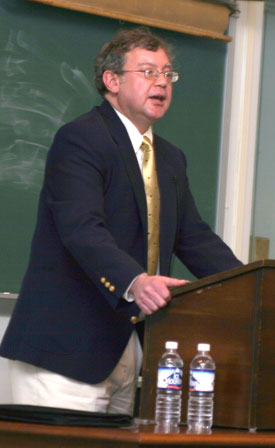The United States has fallen into a slippery slope of eroding basic rights due to the threats of terrorism, said 2006 Brigance Forum Lecturer Marouf A. Hasian Jr.
"I think what’s happened since 9-11 is that we’re more willing to believe that Congress and the judiciary should not put reigns on a strong chief executive," Hasian said Wednesday night. "We’ve been willing to contemplate losses of civil liberties in the name of security, in the name of reducing fear, in the name of stopping terrorist dangers."
 Hasian is Professor of Communication at the University of Utah. He received his PhD and MA in Speech Communication from the University of Georgia, his JD from Campbell University Law School in North Carolina, and his BA from the University of North Carolina. He has written and researched legal rhetoric in the legislative, judicial and executive branches.
Hasian is Professor of Communication at the University of Utah. He received his PhD and MA in Speech Communication from the University of Georgia, his JD from Campbell University Law School in North Carolina, and his BA from the University of North Carolina. He has written and researched legal rhetoric in the legislative, judicial and executive branches.
"What’s happened is we’ve realigned and re-thought what the Constitution means," Hasian said. "We’re willing to say not only is it constitutional, not only is it ok with us that we have a strong executive but we demand it. Natural catastrophes as well as military catastrophe like 9-11 have created a situation where what once was considered to be an emergency exception is now considered the norm we’re willing to live under and that completely alters the way we think about liberties."
Hasian took numerous questions from the nearly 100 in attendance about the President’s domestic spying program. "It includes surveillance, like some of the students brought up. We’re willing to say, ‘you know what, we used to think of it as an invasion of privacy but that was before 9-11. Now we’re willing to say I can lose some of my privacy I want the government surveying people who support terrorists’
"It can include the idea that military tribunals can provide justice even if it’s not the same kind of justice we get in civil trials, it’s a justice that can be swift and meted out to enemy combatants that threaten our country."
He spent a good portion of his prepared remarks discussing the use of martial law, as he defines it the military replacing civil courts. He uses the example of detention of prisoners at Guantanamo Bay as the military putting itself above even the Geneva Convention. He then discussed the paradox of the military not moving fast enough to suit victims of Hurricane Katrina.
The problem, Hasian said, is the slippery slope of compromised rights opens up a Pandora’s Box.
"I think that what’s going to start to happen is that as you go thru the Bill of Rights, we’re going to start to tinker with all of them. For example, what will happen on the internet, or on paper, or what’s written when people critique the president too harshly or say things too harshly that could now be as interpreted as support for terrorism.
"Look at the reaction Bush had when the New York Times reported the news about the secret surveillance. Not only was there a debate about the legality of the surveillance, but there was a debate about whether or not the people who leaked that information were supporting terrorists."
He laments the loss of liberty but finds the public’s desire for more protections curious.
"The idea you had to have reckless disregard for the truth if you were a public official, all these protections built in for journalists, all those types of expansive civil liberties that were part of the discourse of the 60s and 70s now become quaint and passé," Hasian said. The same thing can happen with search and seizure, right to do process, right to protection against self incrimination, all of the Bill of Rights. All those now become luxuries; that’s what I see constantly happening.
"If majority of Americans want this then we may be doing what’s constitutional and this re-alignment taking place may not be this unconstitutional depravation because it’s not coerced, it’s not imposed on us. We’ve not only acquiesced, but we want it. That’s the fascinating rhetorical dimension of this - not that it’s just happening but we’re demanding it."
He is quick to add there are ideologues, mostly neo-conservatives, and military leaders who contribute to the slippery slope. But the slide in civil liberties began during the Reagan administration, through the first Bush, and President Clinton’s presidency.
The Brigance Forum lecture is an annual public lecture or debate in memory of the late William Norwood Brigance. In his 38 years at Wabash College, he taught generations of Wabash students how to be more effective with they spoke. He wrote textbooks used by high schools throughout the country. The Brigance family, friends, and former students have, through their contributions, endowed the annual lecture.
Hewitt is Wabash College's Director of New Media/Web Editor.